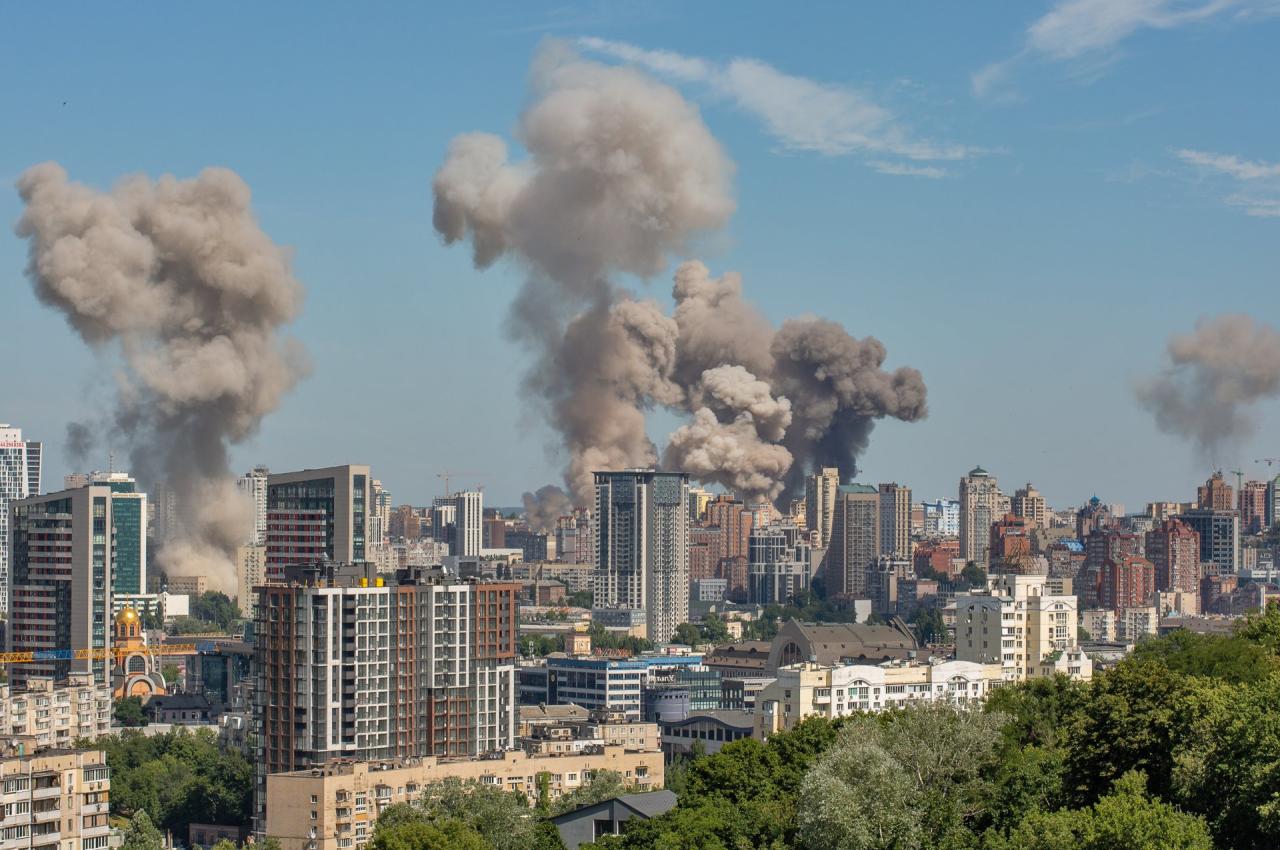The Unending War in Ukraine
With attention on conflicts in the Middle East and domestic politics in the United States, it might be easy to lose sight of the war in Ukraine. But that deadly conflict continues to rage, as it has continuously since Russia invaded in February 2022.
While Ukraine blitzed Russia with drone attacks on June 1, destroying military aircraft far inside Russian territory, the Russians have continued to bombard Ukraine’s capital city, Kyiv, and many other cities with missile and drone attacks. According to the United Nations, June saw the highest number of Ukrainian civilian casualties in any month in more than three years. Ground troops are also locked in battle in the south and east of Ukraine.
Russian leader Vladamir Putin recently reiterated his belief that the Russians and Ukrainians were “one people” and said “in that sense the whole of Ukraine is ours.” That’s yet more evidence that the Ukrainian fight against the Russians is “an existential struggle,” says Oxana Shevel, associate professor of political science at Tufts and co-author of Russia and Ukraine: Entangled Histories, Diverging States.
Tufts Now talked with Shevel about the war, how Ukrainians are coping, and what might lie ahead.
Given that this conflict essentially started in 2014 with the Russian takeover of Crimea and incursion into the eastern Donbas region in Ukraine, is this turning into a forever war?
Russia’s goals remain maximalist, and at the same time, Ukraine is too strong to just surrender. That’s essentially what it comes down to.
It doesn’t have to be a forever war—Russia could just choose to withdraw, or at least recognize that they can’t take over all of Ukraine. But none of that is happening. Based on what I have been reading, hearing, and seeing, Russia hasn’t reconsidered any of its objectives.
It keeps talking about the so-called root cause of the war, which seems to be the existence of a fully sovereign and westward-oriented Ukraine. As long as Russia keeps trying to conquer Ukraine, and Ukraine keeps resisting, there will be a war.
I think Putin believes he can wear out Ukraine and its Western allies. His minions are saying they can fight for 20 years, which I think is gaslighting, but they clearly believe that they can accomplish more than they have already accomplished.
Is there any dissent about the war within Russia? Is it even possible to voice that kind of opinion in Russia?
Expressing any kind of anti-war opinion in Russia is not possible now, because it’s dangerous. If you express it openly, you risk being arrested or worse.
Russia has become a dictatorship under Putin. I’m sure some oligarchs and some Russian elites don’t believe their own propaganda about Ukraine and would have liked for the war to end. But it seems like the whole legitimacy of this regime is based on the war. At the same time, the Russian economy is now structured around sustaining military operations, and this creates a self-reinforcing cycle: war drives the economy, and the economy drives war.
How has the war affected civil society in Ukraine? Does the country still offer a fairly united front against Russia?
The short answer is yes, Ukraine is still fairly united. We see this in the polls. Even those who don’t like Zelensky back him up as a leader. They believe now is not the time to have elections—and that includes opposition people who would run against Zelensky in an election. People may dislike Zelensky for a variety of reasons as an individual leader, but they accept him as a legitimate wartime leader.
But society is fatigued—that’s a mild way of putting it. There have been so many deaths. People have lost homes and jobs. Ukrainians want the war to end. But they don’t want to surrender and subject themselves and their families to Russian occupation and everything that would come with that.
So there is still resilience, everything from innovations in the drone sector to the way the economy retooled itself to the way that local governments still work—trains get around, mail gets delivered. This is a country at war, and you can get a cappuccino a few miles from the war front.
Still, there are air raids every day, bombs are falling, people are sleep deprived. Putin is hoping to break unity in the society, and the more that this goes on, the more unity is tested.
How did Ukraine deal with faltering U.S. support beginning in January, and how is the situation changing now, with a seeming turnaround in the U.S. government attitude toward supporting Ukraine?
When Trump got elected, many in Ukraine were actually quite optimistic, hoping that he will put pressure on Putin to end the war. Instead, until very recently,
the current U.S. administration has been very deferential to Putin and hasn’t put any pressure on him. All the pressure has been on Zelensky and Ukraine.
Ukrainians are very disappointed. Positive attitudes to Trump declined in Ukraine as a result, but people also understand that America is not just Trump so how Ukrainians view Americans is not identical to how they view Trump.
Now there is also some renewed optimism given President Trump’s latest statements that he’s “disappointed” with Putin and his announcement that billions of dollars’ worth of U.S. military equipment will be sent to Ukraine. We are yet to see whether Trump will in fact impose any consequences on Russia if Putin does not agree to the ceasefire.
But in some sense, the loss of U.S. support is less of a problem now than it would have been two or three years ago, because now the Ukrainian defense sector is much more powerful than before. I read statistics that show that Ukraine now produces something like 40% of its military needs—and Europe is not only not backing off, but has stepped up its commitment to aid Ukraine.
Even in the worst-case scenario, if U.S. aid completely stops, that would not lead to Ukrainian surrender. A recent poll asked Ukrainians what the country should do if U.S. aid stops altogether, and 85% said continue fighting with European support.
Are other European countries increasing support for Ukraine?
I think there is a realization that what happens in Ukraine affects Europe, and European countries are stepping up the military spending and preparedness. If Ukraine were to fall, and Putin got the message that the West is weak and divided, why wouldn’t he try something similar in Moldova or Estonia, where there are big Russian-speaking minority communities?
He could always create some pretext to invade by claiming that the Russian speakers have been oppressed, just as he used nonexistent “genocide” of Russian-speakers in Ukraine as one of the justifications for the 2022 invasion.
At least in parts of Europe, we see that realization. Some countries are clearly increasing their defense spending—the Nordic countries, the Baltics, Germany, France.
At the beginning of June, a Ukrainian drone attack on Russian military aircraft that were parked deep inside Russia damaged Russia’s air capacity. What did that do to the war equation?
I think it challenged the narrative that Ukraine doesn’t have any cards still to play. Ukraine bombed the Russian strategic bomber fleet hundreds and thousands of miles from the border. Ukraine said that the operation damaged or destroyed 34 percent of Russia’s strategic cruise missile-carrying bomber fleet, but even if the number of planes hit was smaller, it means that fewer Ukrainian civilians will die, because these are the planes that Russia uses to bomb Ukrainian cities and infrastructure on almost a daily basis.
In the longer term, I think Russia may have problems replenishing this fleet. It also has reputational consequences—Ukrainians showed again that they are capable of doing great damage to Russia militarily. I think there is also a psychological effect, undermining the Russian narrative that they’re somehow invincible, that Ukrainians can’t really do anything against great Russia.
Latest Tufts Now
- In Alaska, an Engineering Student Unlocks the Power of StoriesHaniye Safarpour listens when people talk about life with, and without, water
- Seed Oils Aren’t the Problem—How We Consume Them IsNutrition experts separate fact from fiction on plant-based oils, also known as seed oils, what products to choose, and why you might pick oil over butter or tallow
- What Mamdani’s Victory Says About Engaging Gen Z VotersHis campaign drew a surge of new voters, including young people. Will the youth vote help shape the 2026 midterms, too?
- TB Bacteria Play Possum to Evade VaccinesGenetic study reveals how Mycobacterium tuberculosis survives in vaccinated or previously infected hosts
- The Next Leader of America’s Dentists Sees Opportunity in This MomentThe American Dental Association supports many ways to improve oral health. Fluoride is just one of them
- I Learned the Hard Way About Helping My Father-in-Law with DementiaThis is my story and the lessons I learned—I want to help others who are facing loved ones with memory loss disorders













